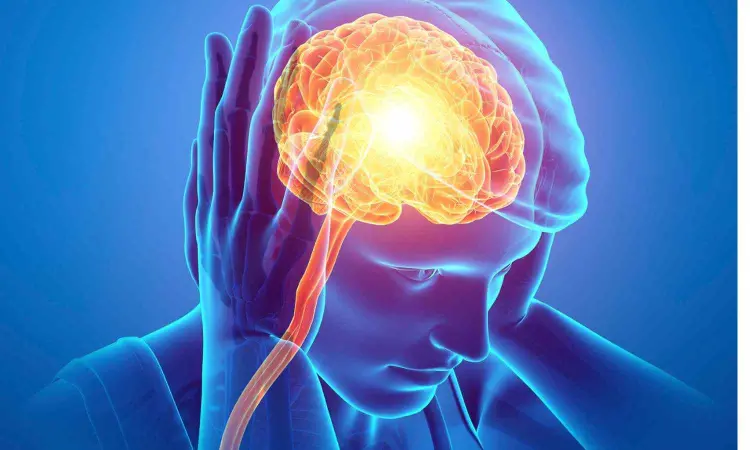- Home
- Medical news & Guidelines
- Anesthesiology
- Cardiology and CTVS
- Critical Care
- Dentistry
- Dermatology
- Diabetes and Endocrinology
- ENT
- Gastroenterology
- Medicine
- Nephrology
- Neurology
- Obstretics-Gynaecology
- Oncology
- Ophthalmology
- Orthopaedics
- Pediatrics-Neonatology
- Psychiatry
- Pulmonology
- Radiology
- Surgery
- Urology
- Laboratory Medicine
- Diet
- Nursing
- Paramedical
- Physiotherapy
- Health news
- Fact Check
- Bone Health Fact Check
- Brain Health Fact Check
- Cancer Related Fact Check
- Child Care Fact Check
- Dental and oral health fact check
- Diabetes and metabolic health fact check
- Diet and Nutrition Fact Check
- Eye and ENT Care Fact Check
- Fitness fact check
- Gut health fact check
- Heart health fact check
- Kidney health fact check
- Medical education fact check
- Men's health fact check
- Respiratory fact check
- Skin and hair care fact check
- Vaccine and Immunization fact check
- Women's health fact check
- AYUSH
- State News
- Andaman and Nicobar Islands
- Andhra Pradesh
- Arunachal Pradesh
- Assam
- Bihar
- Chandigarh
- Chattisgarh
- Dadra and Nagar Haveli
- Daman and Diu
- Delhi
- Goa
- Gujarat
- Haryana
- Himachal Pradesh
- Jammu & Kashmir
- Jharkhand
- Karnataka
- Kerala
- Ladakh
- Lakshadweep
- Madhya Pradesh
- Maharashtra
- Manipur
- Meghalaya
- Mizoram
- Nagaland
- Odisha
- Puducherry
- Punjab
- Rajasthan
- Sikkim
- Tamil Nadu
- Telangana
- Tripura
- Uttar Pradesh
- Uttrakhand
- West Bengal
- Medical Education
- Industry
Robotic-assisted therapy promising in enhancing functional recovery in patients with neurological disorders: Study

The intersection of neurological disorders and gynecological health presents a complex clinical challenge, underscoring the need for innovative therapeutic approaches. Neurological disorders, including conditions such as stroke, multiple sclerosis, and Parkinson’s disease, often manifest in a range of symptoms that impact both motor function and overall quality of life. These symptoms frequently extend to various aspects of health, including reproductive and gynecological functions, which can be adversely affected by neurological impairments.
In recent years, robotic-assisted therapy has emerged as a promising advancement in rehabilitation medicine. This technology utilizes sophisticated robotic systems to support and enhance therapeutic interventions, offering precision, consistency, and adaptability that traditional methods may lack. The application of robotic-assisted therapy in neurological rehabilitation has demonstrated potential benefits in improving motor function, increasing mobility, and enhancing overall recovery outcomes. However, its impact on specific issues such as gynecological health in the context of neurological disorders remains an area of burgeoning interest.
The intricate relationship between neurological disorders and gynecological health presents a significant clinical challenge that has only recently begun to receive focused attention. These impairments can adversely impact various aspects of life, including reproductive and gynecological health.
Robotic-assisted therapy, an innovative advancement in the field of rehabilitation, offers a potential breakthrough in addressing these challenges. This therapy utilizes advanced robotic systems designed to assist, enhance, and sometimes even automate therapeutic exercises and activities. In neurological rehabilitation, robotic systems have demonstrated the ability to improve motor function, increase mobility, and provide precise and consistent therapeutic interventions. Their potential benefits are particularly relevant in addressing complex and multifaceted problems such as those encountered in the intersection of gynecological and neurological health.
Ultimately, this review provided a detailed understanding of how robotic-assisted therapy can contribute to the holistic management of patients with neurological disorders, addressing both their neurological and gynecological needs. By synthesizing the current evidence base, the review aims to inform clinical practice, guide future research, and enhance the overall care and recovery of this unique patient group.
A comprehensive search was conducted across multiple databases including PubMed, Scopus, and Cochrane Library for studies published up to July 2024. Inclusion criteria comprised randomized controlled trials, cohort studies, and case studies that investigated the use of RAT in the management of gynecological issues in neurological patients. Data were extracted on study design, sample size, intervention details, and outcomes related to functional recovery and gynecological function. A total of 15 studies met the inclusion criteria, involving 600 patients with various neurological disorders including stroke, multiple sclerosis, and spinal cord injury. The majority of studies reported that RAT significantly improved gynecological function, as measured by specific scales and assessments. Improvements were observed in areas such as pelvic floor strength, urinary incontinence, and sexual function. Functional recovery was also enhanced, with better outcomes in motor skills, coordination, and overall quality of life. However, variability in intervention protocols and outcome measures was noted.
This review demonstrated that robotic-assisted therapy can significantly improve gynecological function and overall functional recovery in patients with neurological disorders. The positive outcomes in pelvic floor strength, urinary incontinence, sexual function, motor skills, coordination, and quality of life highlight the potential of RAT as a valuable therapeutic tool. However, the observed variability in intervention protocols and outcome measures suggests a need for standardization and further research to refine therapeutic approaches and enhance the overall effectiveness of RAT.
Source: Kauser et al. / Indian Journal of Obstetrics and Gynecology Research 2025;12(3):385–391
MBBS, MD Obstetrics and Gynecology
Dr Nirali Kapoor has completed her MBBS from GMC Jamnagar and MD Obstetrics and Gynecology from AIIMS Rishikesh. She underwent training in trauma/emergency medicine non academic residency in AIIMS Delhi for an year after her MBBS. Post her MD, she has joined in a Multispeciality hospital in Amritsar. She is actively involved in cases concerning fetal medicine, infertility and minimal invasive procedures as well as research activities involved around the fields of interest.


